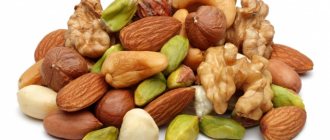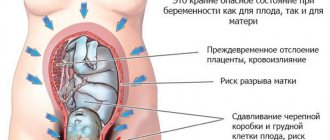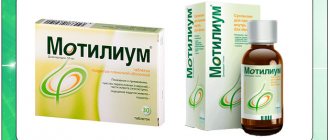Signs of impending labor at 38 weeks
If an increase in temperature really turns out to be a sign of imminent labor, then in addition to this symptom the woman will definitely experience others.
Very often, expectant mothers at this stage experience false contractions, which prepare the body for real ones, they are quite easy to distinguish from each other - when the contraction begins, you just need to get up and walk around, if the pain goes away soon, then the contractions are false.
Also, the woman will feel that the stomach has dropped, and the baby seems to be resting his head on the pubis, this means that he is already preparing to meet his mother and is in a comfortable position for exit during childbirth.
Discharge at 38 weeks is also a sign of impending labor. If they are milky in color with a sour smell and streaks, then this is normal - the cork begins to come off. If the discharge has an unpleasant odor, or if it is cloudy, greenish, or mixed with pus or blood, you should consult a doctor immediately. Temporary hardening of the abdomen (uterine tone) indicates an imminent birth.
Often, a few days before giving birth, weight drops sharply - by 1-2 kg, so it is better to control weight constantly.
At 38 weeks, a woman may begin to be very bothered by swelling, but if it does not cause inconvenience, then this is normal. However, if there is vomiting, diarrhea and high blood pressure, you should urgently seek emergency medical help, as this may be eclampsia, which is caused by gestosis in the 3rd trimester. This condition can lead to very negative consequences.
Prevention and treatment
Although constipation is considered a common problem during pregnancy, it needs to be dealt with. Preventative actions will help you avoid an embarrassing illness that can lead to unpleasant consequences.
Changing food
The fetus is already quite developed and does not need as many vitamins and nutrients as at the beginning of pregnancy. Therefore, as you approach childbirth, you can prescribe a light diet. This will not affect the baby's development, but will help improve digestion. In the extreme, it is better not to consume fermented milk products - kefir, yoghurt.
Drink more fluids
A low amount of water in the body primarily affects intestinal function. If there are no contraindications, drink at least one and a half liters of water per day. Start your morning with a glass of warm water, this will help activate your intestines.
Physical activity
Try to move more even in later stages. The expectant mother will benefit from daily walks in the fresh air or yoga for pregnant women. Such activities will not only have a positive effect on intestinal function, but will also improve your mood.
Diet and an active lifestyle are the main means for preventing and eliminating constipation. But if they do not bring the desired results, you can resort to medications or even folk remedies. You just need to do this with extreme caution; many laxatives can cause an increase in uterine tone. Doctors all over the world recognize glycerin suppositories as the safest remedy for constipation, but they should not be abused.
Diarrhea at 37-38 weeks of pregnancy
After 36 weeks of pregnancy, doctors recommend that a woman undergo procedures to sanitize the genital organs.
This is done in order to maximally prevent the possibility of the baby becoming infected with pathogenic microflora.
Therefore, diarrhea at 37 weeks of pregnancy, provided that the expectant mother has not committed such actions, may indicate the presence of various types of infections in her body, ranging from thrush to other sexually transmitted diseases.
In this case, the gynecologist must take a smear from the vagina for an accurate diagnosis. If the test results show a fungal infection (thrush), then pregnant women should be treated with extreme caution.
Video:
Basically, all oral antifungal drugs are prohibited for use at all stages of pregnancy, including the third trimester.
What to do if thrush is detected? Vaginal suppositories “Flucostat” and “Fluconazole” can be used, therefore, if diarrhea is a consequence of a fungal disease, then doctors prescribe these medications.
If a woman is bothered by diarrhea at 38 weeks of pregnancy, then this may well be a sign of a sudden allergy.
In the third trimester, allergic reactions can spontaneously arise and disappear in the same way, because the woman’s hormonal background experiences great changes.
The body is intensively preparing for childbirth, and even eating proper and healthy food can cause diarrhea.
Traditional medicine suggests making a decoction of the following composition if a woman has diarrhea at 38 weeks of pregnancy: take 4 tsp. rowan fruits, 3 tsp. dry herb St. John's wort, 3 tsp. chopped marshmallow root and mix everything.
Pour a tablespoon of the resulting mixture into ½ liter of boiling water, place in a thermos and leave for 1 hour.
Then drink the strained infusion ½ glass throughout the day. This product will be completely safe for both the pregnant woman and the child.
Video about constipation during pregnancy
We invite you to watch a video in which you can learn how to get rid of constipation during pregnancy without resorting to medications.
Thus, it is better to prevent any disease, including constipation during early pregnancy, than to rack your brains about how to get rid of it later. First of all, you need to think about the health and safety of the unborn baby. What do you think helps, what remedies and medications for constipation during pregnancy are the most effective and harmless? How to get rid of constipation during pregnancy? Have you had any experience dealing with such trouble?
Treatment of constipation during pregnancy
What to do for constipation in pregnant women? How can pregnant women get rid of constipation? Treatment of constipation in pregnant women is a big problem, since most laxatives are contraindicated for them and pose a danger to the unborn child. You need to start dealing with the problem by normalizing your diet.
Nutrition for constipation in pregnant women
The main thing in nutrition is to provide the body with enough fiber. At the same time, it is necessary to prevent gas formation, which can occur when consuming foods rich in fiber (vegetables and fruits). It is best to introduce bran into the diet. The daily norm is 3 tablespoons. They can be filled with kefir and consumed 30 minutes before breakfast.
Medications
How to treat constipation during pregnancy with medication? If proper nutrition does not help normalize stool, you should consult a doctor. It will help you choose the right remedies for constipation for pregnant women that will not harm the woman and the fetus.
Prohibited methods of treatment:
- Enemas - causing instant bowel movements, they provoke uterine contractions. They can be used only before childbirth, without fear of their premature resolution.
- Castor and vaseline oil - they have a mild effect, but due to their high fat content they are not recommended for pregnant women. This increases the load on the gastrointestinal tract, pancreas and liver.
- Laxatives containing senna, rhubarb and buckthorn root cause intestinal spasms.
- Irritants: Regulax, Gutalax, etc.
- Preparations based on salts: sodium sulfate, magnesium.
What pregnant women can do for constipation:
- Suppositories are a local remedy that activates peristalsis. Glycerin suppositories for constipation for pregnant women without additives are safe for pregnant women. Their components are not absorbed into the blood and do not increase the tone of the uterus. But the use of such candles should not be frequent, only in cases of extreme necessity.
- Microlax is an alternative to suppositories in the form of a rectal solution for constipation during pregnancy. The action of this microenema is soft and quick (5-10 minutes).
- Duphalac is a syrup containing lactulose. The probiotic content causes stimulation of beneficial bacteria during long-term use of Duphalac. Feces soften and their volume increases during bowel movements. Instead of Duphalac, pregnant women can use the following laxatives with probiotics: Tranzipek, Forlax.
Folk remedies for constipation during pregnancy
How to deal with constipation during pregnancy using traditional methods? Before using any prescription, you should consult your doctor.
- Dilute fresh potato juice with water 1:1. Drink the product three times a day, ¼ cup before meals.
- Take equal amounts of fennel, anise and cumin. Pour 2 teaspoons of the mixture into ¼ liter of boiling water. Let it brew in a thermos and drink 1/3 cup 3 times a day before meals.
- Make juice from 1 kg of red rowan, add 600 g of granulated sugar to it. Drink ¼ cup morning and evening. Store the product in the refrigerator.
- Take 5-6 apples, chop finely. Boil them in 1 liter of water for 10-15 minutes. The decoction should sit for 4 hours. You should take it three times a day instead of tea.
- Pour boiling water (200 ml) over 1 teaspoon of flax seed. Leave for several hours. Drink at night without straining.
Treatment
Physical activity, necessary for the proper functioning of the gastrointestinal tract, is almost impossible in late pregnancy. Exercises are replaced by light walking in the fresh air.
If your health allows, it is permissible to do special gymnastics, the exercises of which are designed for pregnant women.
Drug therapy
If physical activity is strictly contraindicated, and the diet does not bring the desired result, medication will be required. Most medications are contraindicated during pregnancy; medications can harm the health of the unborn child. It is important to consult a gynecologist before starting drug therapy.
Glycerin or sea buckthorn suppositories are relatively safe means in the fight against the disease. Glycerin-based suppositories are often prescribed by a gynecologist to a pregnant woman for quick emptying. Glycerin is not absorbed by the intestines and does not cause harm to the fetus. Sea buckthorn suppositories are a medicine containing the active substance in the form of sea buckthorn oil. The drug will help get rid of constipation, heal microcracks, and relieve pain.
Enema
An enema will help cope with stool retention. It is permissible to install it only with the permission of a doctor in case of urgent need. Stimulation of the intestines can trigger the onset of labor, which may be slightly premature for 37-38 weeks. At the onset of labor, if a woman cannot empty her bowels, an enema will be required, since the accumulated lump of feces will make it difficult for the baby to pass through the birth canal.
Folk recipes
The folk method of eliminating defecation retention using decoctions of medicinal herbs can be effective, but unsafe for the health of mother and baby. Before using traditional medicine, you should consult your doctor.
Home recipes to combat constipation:
- Dill is a safe plant for pregnant women and newborn children. To get rid of the symptom, you need to brew a tablespoon of plant seeds in a glass of boiling water and leave. Consume before meals.
- A drink made from milk and honey normalizes peristalsis.
- Beetroot decoction will effectively relieve constipation if you drink it before bed. Add prunes and oatmeal to the grated root vegetable, add water to the ingredients and cook over low heat for an hour. Next, the drink is filtered and stored in the refrigerator.
- Herbal decoctions: mint, chamomile, plantain, motherwort are safe for pregnant women and effectively combat stool retention.
Nutrition
To avoid this unpleasant phenomenon, a woman should eat right. General nutritional recommendations:
- A woman expecting a baby needs to eat small and often. Portions are small.
- The most high-calorie and difficult-to-digest foods are eaten at breakfast. Dinner should be light and not late.
- Fried foods and smoked foods are not recommended. Steamed or boiled dishes are allowed.
- Overeating, like fasting, is contraindicated.
- It is important to follow a meal schedule.
- You should avoid snacking on the go. If you feel very hungry, you are allowed to eat a fruit or a handful of berries.
- It is not recommended to lie down after eating.
- Food products must be natural, without flavorings or dyes.
The daily diet includes foods containing coarse fibers. Kefir will help digestion. It is important that the fermented milk drink is fresh. If you are prone to constipation, the following foods are allowed:
- Dried fruits.
- Millet, oatmeal, buckwheat.
- Bread with bran.
- Drinks allowed are pure water without gas, dried fruit compotes, and green tea.
- Soft-boiled egg.
- Lean meat.
- Fish.
Your daily diet must include fruits and vegetables. Plant foods are useful in raw and thermally processed forms. Compotes and juices are made from fruits; they can be consumed raw or baked.
Strong tea, coffee, semolina dishes, confectionery, and slimy soups should be excluded from the menu.
Dangerous sign or normal
A woman can independently distinguish a symptom of a prenatal condition from a pathological process. Dangerous symptoms are:
- very frequent loose stools;
- feces with mucus;
- stools are heterogeneous, with particles of undigested food, foamy;
- diarrhea of a sour or foul odor, uncharacteristic of the usual;
- unusual shade of feces, stools of white, black, green and other colors;
- I have a stomachache;
- intoxication, increased body temperature, nausea, and vomiting occur.
If the temperature increases, all doubts disappear. This is clearly a pathological process, the presence of which requires urgent diagnosis and elimination.
A pregnant woman herself will feel that labor is approaching, and diarrhea is caused precisely by this reason. The following signs are the norm:
- prolapse of the abdomen;
- frequent urge to urinate;
- pain in the lower abdomen and lower back;
- changes in mood, a nervous state appears;
- decreased appetite, which leads to weight loss;
- Uterine contractions are intermittent and the baby is unusually active.
With such manifestations, this is normal stool before childbirth.
Nausea and vomiting at 39 weeks of pregnancy
Nausea at 39 weeks of pregnancy can serve as a precursor to labor. During pregnancy, hormone-like substances prostaglandins accumulate in a woman's body. The accumulation of this substance, together with changes in the uterus, affects internal organs, including the intestines and stomach. If a woman feels nauseous at 39 weeks, this may mean that the uterus has begun to dilate.
Vomiting at 39 weeks of pregnancy may also indicate prenatal changes in the body. However, if you experience severe vomiting and general malaise, you should consult a doctor. It could be an infection.
A pregnant woman often suffers from severe heartburn at 39 weeks of pregnancy. This occurs due to the fact that the fetus puts pressure on the woman’s internal organs. Because of this, stomach contents enter the esophagus and lead to heartburn. Heartburn is not dangerous for the mother and child; it occurs in most pregnant women.
To prevent all these problems, eat small portions and do not overeat. Avoid eating spicy and heavy foods, as well as foods that may cause allergies. Try to have dinner 3 hours before bedtime and chew your food thoroughly.
What can it affect?
Constipation is a rather uncomfortable sensation that can affect a woman’s condition differently at different stages of pregnancy.
- Constipation at 32 weeks. During this period, constipation causes a woman to feel quite uncomfortable; there is a constant heaviness in the abdominal area. Due to constant flatulence, the uterus is in good shape, and this affects the general condition of the woman and the fetus.
- Constipation at 38 weeks. At this stage, constipation can cause a woman severe pain in the abdominal area, which puts her in a stressful state, and this negatively affects the health of the unborn baby.
- Constipation at 39 weeks. During this period, severe pain may also be present, which, combined with the woman’s worries about an imminent birth, can provoke earlier labor.
- Constipation at 40 weeks. The presence of constipation during this period can significantly affect the ease of childbirth, because due to straining, the woman’s uterus is in constant tone.
What is the best remedy for constipation at 40 weeks of pregnancy?
Not every woman manages to carry her baby to 40 weeks of pregnancy; many births occur earlier. The baby, not in a hurry to be born as quickly as possible, reaches a large size at 40 weeks and completely fills the uterus. Normally, its head should be lowered down and located in the mother’s pelvic area. The baby curls up into a ball and waits in this position to be born.
The last days before giving birth are filled with agonizing anticipation for a pregnant woman. On the one hand, she can’t wait to see her long-awaited baby, but on the other hand, the expectant mother is already pretty tired of her huge belly and the inconveniences associated with it. In addition, many women begin to complain of constipation at 40 weeks of pregnancy. Problems with timely bowel movements can appear at any stage of pregnancy, even in those women who were previously unfamiliar with the problem of constipation.
However, sudden constipation immediately before childbirth is most often caused by the pressure of a huge uterus on the pregnant woman's intestines, which is why stool cannot move normally to the exit. In addition, the causes of constipation in late pregnancy can be a woman’s low physical activity, poor diet, hormonal changes in the body and stress caused by anticipation of childbirth. All of the above reasons can cause difficulties with bowel movements at an earlier stage.
To prevent constipation, a pregnant woman should try to stay on her feet until the birth, walk in the fresh air, and do light exercises. It is clear that a huge belly is tempting to lie down, but you need to find the strength for moderate physical activity, since a sedentary lifestyle will bring not only constipation, but also additional problems during the birth itself.
Women who complain of bad stool need to reconsider their diet. It should contain large quantities of fruits and vegetables, raw and baked, fermented milk products and bran. A glass of slightly warmed water, drunk on an empty stomach, is the most effective way to prevent constipation in pregnant women. There are cases that at 40 weeks constipation occurs as a result of a pregnant woman’s fear of pushing once again, fearing that this may provoke labor.
Pregnant women who are forced to be on medication should note that medications can also cause problems with timely bowel movements. If the cause of constipation is in the pills, then the expectant mother needs to inform her doctor about this. By changing the treatment, you can get rid of this unpleasant and delicate problem.
Constipation in pregnant women must be treated. Not only does it cause discomfort in the form of pain, bloating, increased gas formation and a feeling of heaviness, it also poses a serious danger to the health of the mother and her baby. If feces remain in the intestines for a long time, they form toxins that cause general poisoning of the body of the pregnant woman and the fetus. In addition, the consequences of constipation can be anal fissures and hemorrhoids.
Unfortunately, treating constipation during pregnancy with medications is very dangerous, since almost all laxatives are contraindicated for pregnant women. But there are many traditional methods of treating this scourge.
For constipation, a salad of grated carrots and apples, seasoned with a dessert spoon of sour cream or grape juice, helps well. This salad, eaten at night or a couple of hours before breakfast, like a broom, sweeps everything out of the intestines.
Women who have problems with bowel movements should stock up on prunes. Prune infusion is very effective for constipation. To prepare it, you need to pour boiled water over several dried fruits and leave overnight. In the morning, strain the resulting infusion, rub the softened prunes through a sieve, add to the liquid and drink. It is recommended to drink a glass of boiled water half an hour before taking the prune infusion.
The danger of late bowel retention
Diarrhea and frequent training contractions are harbingers of labor. Rare stool before childbirth can also indicate the end of pregnancy. The reason is simple: the baby’s head has dropped and puts pressure on the intestines, preventing feces from moving normally. But constipation is dangerous due to complications and therefore requires treatment.
Constipation before childbirth negatively affects the health of the mother. Due to the difficult process of defecation, the contents of the intestine, and along with it, harmful substances, stagnate. They are absorbed through the intestinal walls into the blood.
Consequences of constipation in the late term:
- Intoxication.
- Long-term constipation provokes the appearance of cracks in the anus and inflammatory processes in the intestines.
- Varicose venous plexuses of the rectum.
- The beginning of labor.
Due to a crowded intestine, the general condition of a pregnant woman worsens. She feels nausea, abdominal pain, heaviness in the abdominal cavity.
Intoxication
Through the intestinal mucosa, fluid and nutrients are absorbed into the blood. Prolonged fecal retention promotes the absorption of toxic substances, which causes:
- Feeling of lack of energy.
- Headache.
- Nausea.
- Lack of appetite.
Intoxication is dangerous for a woman and an unborn baby: toxins can penetrate the placental barrier.
Haemorrhoids
In late pregnancy, an enlarged uterus and a crowded intestine place serious pressure on the pelvic vessels, which leads to difficulty in the outflow of blood. The intestinal veins dilate. Signs of hemorrhoids include:
- Prolonged absence of bowel movements.
- Itching sensation in the anus.
- Painful sensations.
- Blood from the anus.
Symptoms of the disease worsen a woman’s quality of life and negatively affect her emotional state. At the first signs of illness, consult a doctor. Early treatment will help prevent complications.
Start of labor
Doctors agreed that pushing at any stage of pregnancy is dangerous, but delayed bowel movements also pose a real threat to a woman’s health
For this reason, it is important to prevent constipation
Prevention
Treating constipation during pregnancy with modern medications is prohibited. Therefore, doctors advise paying more attention to prevention. Pregnant girls are advised to avoid emotional stress and stress, which often cause deterioration of intestinal motility.
Also, if you are prone to constipation, you should carefully monitor the amount of fluid you consume. Doctors advise drinking at least 2 liters of clean water a day. Constipation is often caused by improper food intake. Large pieces take a long time to digest; food must be chewed thoroughly.
To avoid unpleasant symptoms in the later stages, you need to carefully monitor your diet. It is recommended to exclude the following foods from the diet:
- Causing flatulence - cabbage, legumes.
- Dishes with viscous consistency.
- Products containing essential oils.
- Products containing tannin.
It is extremely difficult to treat the disease for a pregnant woman. It is easier to prevent symptoms by following simple recommendations.
Constipation at any stage of pregnancy is a dangerous symptom for mother and baby. It is important to quickly eliminate it using available means without causing harm to the fetus. To do this, you need to tell your doctor about the delicate problem, who will help you cope with the phenomenon.
Dangerous consequences of constipation
Constipation is far from being as harmless a disease as it might seem at first glance, and it threatens not only with discomfort and heaviness in the abdomen. There are three most dangerous consequences of constipation during pregnancy.
Just one week without bowel movement leads to such internal pressure in the intestines that toxins (formed during the processing of food and under normal conditions are quickly removed from the body) begin to leak through its walls into the blood. As a result, intoxication can threaten not only the mother, but also her fetus.
Even longer stagnation of feces can lead to serious tissue inflammation - the consequence of which is first the appearance of anal fissures, and then diseases such as hemorrhoids, colitis and proctosigmoiditis (over time developing from acute to chronic).
Severe constipation and the inability to go to the toilet normally forces a woman to push. Under normal conditions this is not so scary, but for pregnant women it can result in a miscarriage.
What is the danger of constipation before childbirth?
Every woman should understand that stool retention is not the norm. The problem can lead to complications during pregnancy and childbirth. The consequences for the body of untreated constipation can be extremely serious and cause:
- development of dysbacteriosis;
- inflammation of the pelvic organs;
- imbalance of vaginal microflora;
- hypertonicity of the uterus due to bloating;
- the appearance of hemorrhoids in a woman.
The main danger of constipation is associated with intoxication. Due to stagnation of feces, toxins are released into the body. As a result, the expectant mother’s well-being worsens; nausea, vomiting, discomfort, heartburn and headache may appear.
Toxins also have a negative effect on the fetus; they penetrate into its blood from the mother. With prolonged constipation, gas formation in the intestines increases. At 38, 39 and 40 weeks, this is fraught with the development of uterine hypertonicity and premature birth.
The birth itself may be complicated, and labor may slow down. Therefore, even a slight discomfort requires urgent consultation with a doctor.
Use of folk remedies
To achieve a not so quick, but long-term effect in the fight against constipation, folk remedies are also very useful. They are prepared both in the form of mixtures and in the form of decoctions, and are based mainly on dried fruits, known for their laxative effect.
Examples of the first and second include:
A mixture of raisins, dried apricots and prunes in honey.
- dried fruits are thoroughly washed and ground in a meat grinder;
- Honey is added to the resulting mixture, mixed and left in the refrigerator for a day.
2 teaspoons at night, washed down with water warmed to approximately body temperature.
Decoction with prunes
- rinse dried fruits and cut in half;
- Peel the beets and cut into cubes;
- pour the prepared ingredients into a saucepan, add water and brew (boil over low heat for 1 hour).
- let the broth cool, strain through cheesecloth or a fine sieve and leave in the refrigerator for a day.
1 glass at night.
Important! Almost all herbal decoctions used to treat constipation in ordinary cases (rhubarb, senna, buckthorn, etc.) are prohibited during pregnancy!
Remedies for constipation
The safest measures to eliminate constipation in pregnant women are methods that, if possible, do not involve the use of medications.
The first way is a diet, which should ensure that the body receives as much fiber as possible. While in the body, it swells, forming more feces, thereby facilitating the rapid emptying of the intestines. With such a diet, to combat constipation, you should eat as many tomatoes, carrots, cucumbers, beets, apples, and pumpkins as possible. Any fermented milk products have a very good effect for removing feces: sour cabbage soup, yogurt, and definitely kefir. To stimulate peristalsis, it is necessary to consume vegetable fats. You should not consume large quantities of strong black tea, coffee, white flour products, chocolate, or semolina porridge.
If you have severe bloating or constipation, you should take herbal infusions: chamomile, mint, dill, cumin. However, before using them, you should definitely consult with a leading obstetrician-gynecologist, and, if necessary, a therapist. You can't eat it dry. This also provokes the development of constipation.
You cannot stand on your feet for a long time or lift heavy objects. It is necessary to do light physical exercises to strengthen and stimulate the pelvis.
How to fix the problem
Periodically occurring constipation in the ninth month of pregnancy is an undoubted indicator that the digestive system needs help. In order to stabilize the functioning of the intestines it is necessary.
- Review your diet. In the last weeks of pregnancy, the body of the unborn child no longer needs the set of vitamins and microelements that it needed immediately after conception. Therefore, a woman can even go on a light diet - this will not affect the development of the fetus in any way, but will make labor easier. Just before giving birth, it is advisable to consume fermented milk products; decoctions of dried apricots and prunes, fresh fruits, and vegetable salads are good for constipation.
- Drink more water. Currently, it is believed that consuming large amounts of liquid does not affect the appearance of edema; moreover, if the pregnant woman’s body receives little water, this, on the contrary, can cause swelling. They refuse water only if it is strictly recommended by the gynecologist.
- Move more. Just before giving birth, you shouldn’t lie down a lot. Insufficient physical activity has a negative impact on labor and, as has already been found out, becomes a cause of constipation. Leisurely walking and simple housework will not only improve intestinal function, but also strengthen the nervous system.
If diet and lifestyle changes do not help cope with constipation, you can use folk remedies. But it must be borne in mind that not all of them are safe for pregnant women. You need to choose those methods for eliminating constipation that do not increase the tone of the uterus.
Suppositories with glycerin and sea buckthorn extract can help ease bowel movements. They can be used by pregnant women, but it is advisable to resort to suppositories as rarely as possible.
Prevention of constipation in pregnant women
To prevent such an unpleasant problem from affecting pregnant women, there are a number of preventive measures to prevent constipation.
The diet should be designed taking into account the consumption of foods rich in fiber, which will improve digestion. The daily menu must include soups or other liquid dishes.
Pregnant women must follow a drinking regime. Water should be consumed in large quantities, it must be purified. To avoid swelling, you should not eat salty foods, which will retain water in the body.
A pregnant woman should try to move as much as possible. Little physical activity provokes slow digestion, and as a result, constipation before childbirth. This could be walking on the street, in a park, away from busy streets, where the air is cleaner, or simple warm-up exercises.
The best way to avoid the possible occurrence of fecal stagnation during pregnancy is its prevention. However, if the problem cannot be avoided, you must be patient and follow all doctor’s orders. You should absolutely not abuse folk remedies taken from unreliable sources or treat constipation before childbirth on your own.
Treatment methods
Experts recommend maintaining an active lifestyle as much as possible, taking walks until the very birth. Attending preparatory courses for expectant mothers and doing gymnastics for pregnant women will minimize the likelihood of developing diarrhea.
To prevent fluid loss, the expectant mother needs to drink enough water, fruit or vegetable juices; with the permission of the supervising doctor, you can drink mineral water (with or without carbonated water), special diet or protein shakes
Until diarrhea completely stops, it is important to remove milk and dairy products from your diet, in particular kefir, yogurt and sour cream. It should be remembered that to maintain intestinal motility, you need to move more and take daily walks, but with diarrhea, rest and rest are recommended
Permitted and available pharmaceutical products include activated carbon and adsorbents.
| Activated carbon | 1 tablet per 10 kilograms of weight, at least twice a day | From 17 rub. 20 kopecks per package |
| Smecta | 1 sachet three times a day | From 148 rubles per package (10 sachets) |
| Enterosgel | Three times a day, a tablespoon dissolved in 100 ml of boiled water | A tube of paste and a can of granules cost about 225 rubles |
Diet to prevent diarrhea
Entering the last trimester, a woman needs to be especially careful when choosing food and preparing a daily diet.
It is recommended to avoid the following foods that can cause irritation of the intestinal mucous membranes:
- fried, smoked and spicy foods;
- salt, pepper and spices;
- coffee and strong tea;
- carbonated, tonic and caffeinated drinks.
It is important to create a diet so as to completely eliminate overeating or long time intervals between meals. It is best to eat small meals and at the same time
It is important to follow a diet; the last trimester is the hardest, so the diet should be light, but rich enough in vitamins and minerals.
Allowed to eat:
- porridge;
- boiled low-fat meat;
- chicken broth soups;
- vegetables and fruits.
Berry jelly and following a three-day rice-banana diet will help normalize stool and consolidate it.
Preventive actions
And of course, we should never forget about disease prevention.
Nutrition
One of the most important factors that can prevent unwanted constipation during pregnancy is the correct diet of the expectant mother. In order to make the fight against constipation more effective, it is important not only to choose the right food products, but also to create a schedule for eating food.
It is recommended for late pregnant women to consume:
- vegetables and fruits not only raw, but also baked;
- bran or black bread;
- dried fruits, especially prunes;
- meat with connective tissues;
- buckwheat, oatmeal and barley;
- various fats of vegetable origin;
- Be sure to drink enough liquid.
Gymnastics
Physical exercise will be no less effective. If the expectant mother does not have any contraindications for physical exercise, then in this case it will not be superfluous to:
- swimming;
- daily morning exercises;
- specially designed breathing exercises.
Even regular walks will benefit the mother and her unborn baby .
Unfortunately, today there is no universal drug in the fight against constipation for a pregnant woman in pharmacology.
However, every expectant mother must do everything possible to avoid its occurrence.
Causes of constipation in later stages
Obstetricians consider the main reasons for difficulty in bowel movement to be:
- Compression of the intestinal loops by the uterus with the child or the fetal head descending into the pelvis before childbirth. Difficulty in bowel movement occurs due to the fact that parts of the intestine are greatly narrowed and the passage of a bolus of food through the intestines is difficult. At the site of narrowing, fecal masses accumulate, which, due to additional absorption of moisture from the mucous membrane, become dense, making their further movement difficult.
- Changes in hormonal levels. In the last weeks of pregnancy, the synthesis of progesterone, which relaxes the muscles of the uterus, decreases, and the production of estrogen increases. Normally, the hormone stimulates increased contractions of the reproductive organ and cleansing of the intestines to facilitate the birth of the baby. With strong mechanical compression of areas of the intestine, the opposite effect is possible when hypertonicity of smooth muscles causes spastic constipation.
The following factors enhance the negative impact of hormonal changes and mechanical compression:
- Reducing the amount of food. A few days before the onset of labor, the expectant mother's appetite decreases. Insufficient food leads to the fact that little feces are formed, which makes it difficult to empty the rectum.
- Fluid restriction. In the last months of pregnancy, women are often bothered by swelling. During this period, placental blood flow and amniotic fluid are formed, so doctors recommend fluid restriction for the pregnant woman. Reducing your water intake will reduce swelling, but will make your stools hard and constipated.
- Sedentary lifestyle. In the last months of pregnancy, an enlarged belly makes physical activity difficult, causes lower back pain and other symptoms associated with stress on the musculoskeletal system and internal organs. You try to move less to avoid discomfort, so your intestinal activity decreases and constipation appears.
- Diet violation. Throughout your pregnancy, you have given up unhealthy but tasty foods. Before giving birth, due to changes in hormonal levels and taste preferences, you want to eat something tasty. You break your diet by eating spicy or salty foods, but your stomach does not produce enough enzymes for heavy foods, digestion becomes difficult, and defecation is delayed.
Constipation during late pregnancy is dangerous, and the accumulation of stool in the colon causes additional discomfort. An intestine overflowing with feces puts pressure on the reproductive organ, negatively affecting the preparation of the fetus for birth.
Constipation symptoms
Constipation is the absence, difficulty, or incomplete bowel movement for more than two days. During the act of defecation, a woman feels pain. Symptoms:
- Feeling of fullness in the intestines.
- Abdominal pain of a cramping or aching nature.
- Nausea.
- The need for straining.
- Lack of appetite.
- Irritability.
- Bloating.
With constipation, the consistency of the stool changes, it becomes hard and its volume is small. The act of defecation does not bring relief.
It is important to eliminate constipation; the acute form can become chronic, and after delivery the woman will continue to suffer from an unpleasant symptom.










